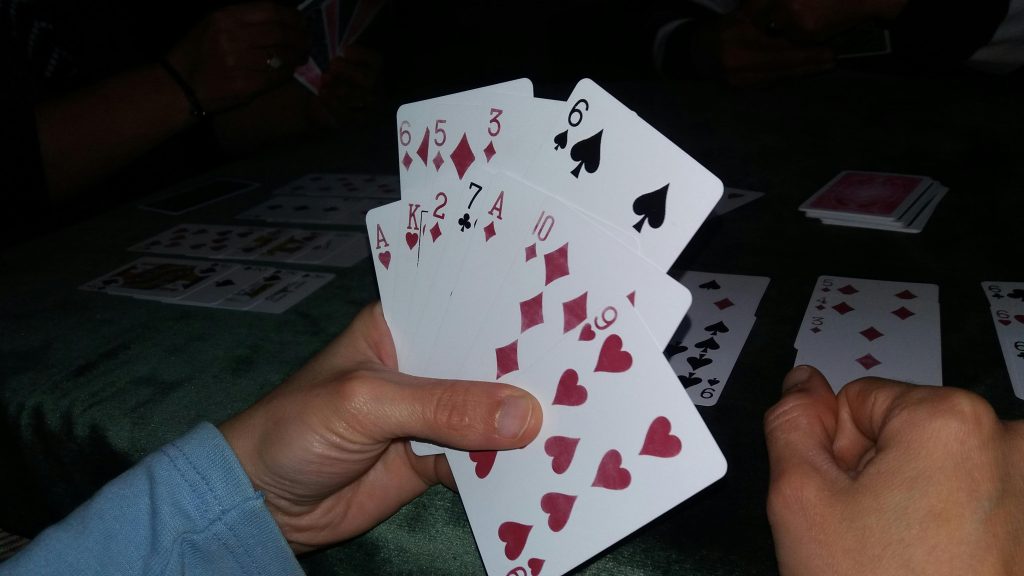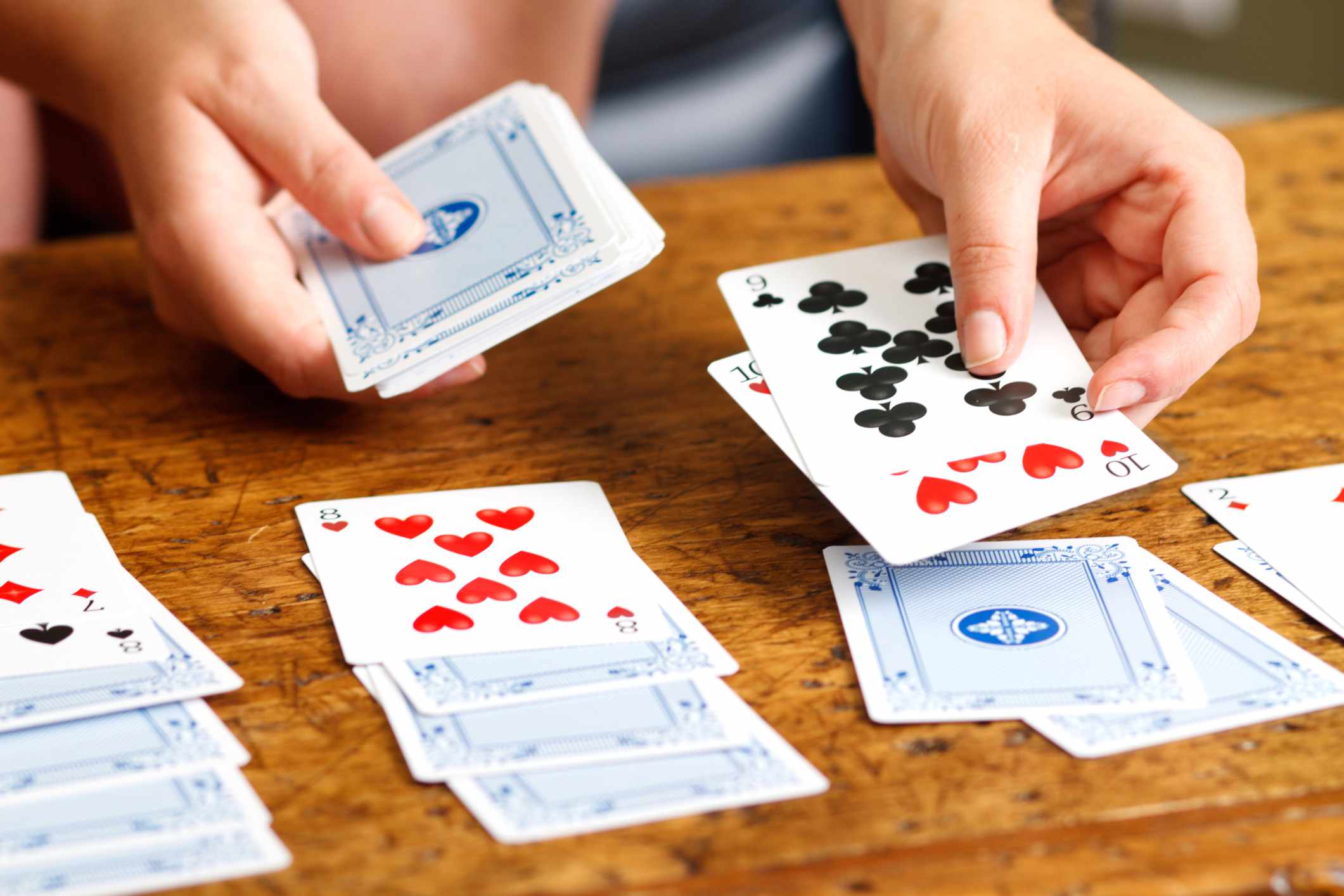In the vast world of card games, single player card games hold a unique charm and appeal. These one player card games have been a favorite pastime for many, offering a blend of challenge, strategy, and entertainment. Whether you’re looking to unwind after a long day or sharpen your mental acuity, card games to play by yourself provide the perfect escape.
The popularity of card games has surged in recent years, partly due to their accessibility and the rise of digital versions. From classic games like Solitaire to modern innovations such as Food Chain Island, the variety of options available ensures that there’s something for everyone.
The history and evolution of single player card games
The origins of card games date back to ancient China, where paper playing cards first emerged during the Tang dynasty (618–907 AD). These early card games spread across Asia and eventually reached Europe, evolving into various forms. Initially, most card games were multiplayer, designed for social interaction and competition among friends and family. However, the concept of card games began to gain traction as people sought ways to entertain themselves in solitary moments.
The first significant solo card game to achieve widespread popularity was Patience, commonly known as Solitaire. It is believed to have originated in the 18th century in Northern Europe. The game’s simple yet strategic nature made it an ideal pastime for individuals seeking to engage their minds without the need for an opponent. As Solitaire spread across Europe, it became a staple in households and later gained immense popularity in the United States, especially during the 19th century.
The transition from traditional multiplayer games to single player formats marked a significant evolution in the card game world. Сard games provided an excellent solution, offering players the opportunity to enjoy strategic gameplay on their own terms.
The digital age brought about another revolution for single player card games. With the advent of personal computers and mobile devices, classic games like Solitaire were digitized, making them more accessible than ever. Microsoft’s inclusion of Solitaire in its Windows operating system in the early 1990s played a crucial role in popularizing the game globally.
Modern solo card games: single player card games
In recent years, the landscape of сard games has expanded significantly, offering enthusiasts a variety of engaging and innovative options. Modern card games to play by yourself have evolved beyond traditional formats, introducing unique mechanics and immersive themes that captivate players. Three standout examples of contemporary single player card games are Food Chain Island, Sprawlopolis, and Sylvion. These games not only provide a fresh take on solo gaming but also offer expansions and variations to enhance the experience further.
Food chain island
Food Chain Island, designed by Scott Almes, is a compact yet deeply strategic solo card game. The game consists of 18 cards, each depicting an animal with a specific number and ability. Players arrange these cards in a 4×4 grid and must strategically move the animals to “eat” others with lower numbers. The goal is to end with as few animals remaining as possible. Each animal has a unique ability activated upon eating another, adding layers of complexity and requiring players to plan several moves ahead.
The simplicity of the setup, combined with the depth of strategy, makes Food Chain Island one of the best solo card games for quick, engaging sessions. The game also offers a few expansions that introduce new animals and abilities, providing additional challenges and replayability.
Sprawlopolis
Sprawlopolis, created by Steven Aramini, Danny Devine, and Paul Kluka, is another exemplary single player card game. This single player card games involves building a city using 18 double-sided cards, each featuring four quadrants representing different types of districts: residential, commercial, industrial, and parks. The objective is to score points based on specific criteria that change each game, adding variety and keeping the gameplay fresh.
Players must carefully place cards to optimize their city layout while balancing the different scoring conditions. The game’s design encourages strategic thinking and spatial planning, making it a compelling choice for fans of card games to play by yourself. Sprawlopolis also includes several mini-expansions that introduce new scoring objectives and challenges, further enriching the solo gaming experience.
Sylvion
Sylvion, part of the Oniverse series by Shadi Torbey, is a solo card game set in a mystical forest under threat from a raging fire. Players must manage a deck of cards representing elements such as water and trees to combat the fire and save the forest. The game combines resource management and tactical decision-making, as players balance immediate needs against long-term strategy.
Sylvion offers both an easy mode for newcomers and a more challenging mode for experienced players, ensuring that it appeals to a wide audience. Additionally, the game features expansions that introduce new elements and scenarios, providing more depth and variety.
Benefits of playing card games by yourself

Engaging in one player card games offers a multitude of cognitive and emotional benefits. These card games to play by yourself not only provide a source of entertainment but also enhance mental agility and emotional well-being. Here are some key benefits of enjoying сard games:
Improvement in strategic thinking
Playing single player card games like Solitaire or Food Chain Island requires players to plan several moves ahead, fostering strategic thinking and problem-solving skills. By continuously analyzing the best possible outcomes and adapting strategies as the game progresses, players sharpen their cognitive abilities. This improvement in strategic thinking can have broader applications, helping individuals in decision-making processes in everyday life.
Relaxation and stress relief
Many players turn to single player card games as a means to unwind and relax. The focused nature of these games allows individuals to immerse themselves in the activity, providing a mental break from daily stresses. The repetitive actions and clear objectives offer a calming effect, making these games an excellent tool for stress relief. As one avid player, Sarah, shares, “Playing Solitaire every evening helps me decompress after a busy day. It’s my little escape that brings me peace.”
Enhanced concentration and memory
Solo card games demand a high level of concentration and memory retention. Games like Sprawlopolis and Sylvion require players to remember specific rules and track the positions of various cards, which in turn enhances memory skills. Regularly engaging in these games can improve one’s ability to focus and recall information, skills that are valuable in both personal and professional settings.
Sense of accomplishment
Completing a challenging one player card game can provide a significant sense of accomplishment. The feeling of success after successfully navigating a complex game boosts self-esteem and confidence. This emotional benefit is particularly valuable for individuals who may seek validation or a sense of achievement in their daily lives.
Anecdotes and quotes
Many players have shared their positive experiences with сard games. For example, James, a long-time fan of single player games, states, “I love the mental challenge these games provide. It’s like a workout for my brain, and I always feel a sense of triumph when I complete a difficult game.” Such testimonials highlight the personal fulfillment and enjoyment that these games can bring.
How to choose the best solo card game for you
Selecting the right single player card game involves considering various factors that align with your personal preferences and skill levels. With a plethora of сard games available, understanding these factors can help you find the perfect game to enjoy.
Game Complexity
The complexity of a game is a crucial factor to consider. If you’re a beginner, opting for simpler card games like Klondike Solitaire or Pyramid is a good starting point. These games have straightforward rules and provide a gentle introduction to solo card gaming. For experienced players seeking a challenge, games like Sylvion or Food Chain Island offer deeper strategic elements and require advanced planning and decision-making skills.
Playtime
The amount of time you have available for single player card games is another important consideration. If you’re looking for quick sessions, games like Sprawlopolis, which typically take 15-20 minutes, are ideal. These short games can fit into a busy schedule and provide a quick mental workout. On the other hand, if you prefer longer, more immersive sessions, consider games like Napoleon at St. Helena, which can take up to an hour or more to complete.
Thematic Elements
The theme of a solo card game can significantly enhance your gaming experience. Choose a theme that resonates with you to make the gameplay more engaging. For instance, if you enjoy nature and wildlife, Food Chain Island’s animal-centric theme might appeal to you. For those who love city-building and strategic planning, Sprawlopolis offers a delightful urban planning experience. Meanwhile, Sylvion’s mystical forest theme provides an enchanting and strategic battle against fire.
Recommendations for different types of players
- Beginners: Start with classic games like Klondike Solitaire or Pyramid. These games have simple rules and provide a good foundation for understanding solo card gameplay.
- Strategy Lovers: If you enjoy deep strategic thinking, consider Sylvion or Food Chain Island. These games require careful planning and offer a rich, tactical experience.
- Quick Game Seekers: For those with limited time, Sprawlopolis or Beehive Solitaire are excellent choices. These games are quick to set up and play, making them perfect for short breaks.
- Thematic Enthusiasts: Choose a game that matches your interests. For example, if you enjoy fantasy themes, Sylvion’s battle to save the forest will be captivating. If urban planning fascinates you, Sprawlopolis provides an engaging puzzle.
By considering these factors, you can select a single player card game that not only entertains but also suits your lifestyle and interests.
Tips and strategies for mastering single player card games

Mastering single player card games requires more than just understanding the rules. To excel in card games, you need to develop advanced strategies and adopt a winning mindset. Here are some tips and strategies to help you improve your gameplay and enjoy these сard games to the fullest.
General tips for various games
- Plan ahead In many card games, such as Solitaire and Sprawlopolis, planning several moves ahead is crucial. Always consider the potential outcomes of your actions before making a move. This foresight can help you avoid pitfalls and set up advantageous positions.
- Stay organized Keeping your cards well-organized can make a significant difference. Ensure that your tableau or play area is neat, which helps in visualizing possible moves and strategies. For example, in games like Food Chain Island, having a clear layout can help you better manage the sequence of animal actions.
- Practice regularly Like any other skill, practice is key to mastering сard games. Regular play helps you become familiar with the game’s mechanics and improves your strategic thinking. Set aside time to play consistently, and you’ll notice gradual improvement.
- Learn from mistakes Every loss is an opportunity to learn. Analyze your gameplay to identify mistakes and understand what went wrong. This reflection helps in avoiding the same errors in future games. Keeping a journal of your games can be beneficial for this purpose.
Specific strategies for popular titles
Solitaire (Klondike)
- Prioritize uncovering hidden cards: Focus on revealing face-down cards in the tableau to increase your options.
- Use the stockpile wisely: Don’t rush through the stockpile. Plan your draws to maximize your chances of success.
- Build evenly: Try to build all tableau piles evenly to avoid getting stuck with immovable stacks.
Sprawlopolis
- Optimize placement: Place cards in a way that maximizes your score based on the game’s changing objectives. Pay attention to both the immediate and long-term impacts of each card placement.
- Balance objectives: Since the scoring objectives vary, balance your efforts to meet multiple goals simultaneously.
Sylvion
- Resource management: Carefully manage your water cards and trees. Don’t spend them too early; instead, use them strategically to combat the fire effectively.
- Anticipate fire movements: Predict and plan for the fire’s path to position your defenses optimally.
Common mistakes to avoid
Playing too quickly: Rushing through a game often leads to mistakes. Take your time to think through each move, especially in complex for single player card games.
Ignoring the rules: Fully understanding and adhering to the rules is essential. Overlooking a rule can lead to incorrect moves and lost opportunities.
Lack of focus: Maintaining focus throughout the game helps in making better decisions. Avoid distractions and stay concentrated on the game.
Adopting a positive and strategic mindset is key to mastering сard games. Approach each game as a learning experience and stay patient. Celebrate your progress and small victories, as they contribute to your overall improvement.
The joy of single player card games
From classic games like Solitaire to innovative titles such as Food Chain Island, card games offer endless opportunities for strategic thinking, relaxation, and personal achievement. The benefits of engaging in these сard games include improved cognitive skills, stress relief, and a deep sense of satisfaction.
Choosing the best solo card single player card games depends on your preferences for complexity, playtime, and thematic elements. Furthermore, mastering these games involves planning ahead, staying organized, and learning from each session, which can significantly enhance your gameplay experience.
The world of card games to play yourself is vast and inviting. We encourage you to explore these games, discover new favorites, and enjoy the myriad benefits they offer. Embrace the challenge and joy that сard games bring, and let them become a delightful part of your daily routine. Happy gaming!

